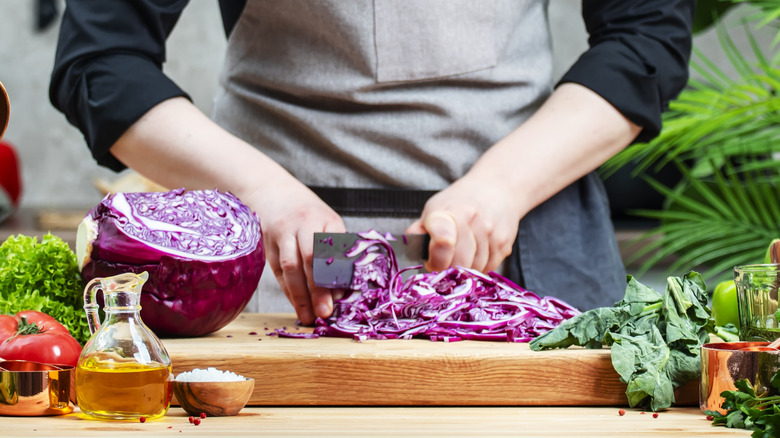
Cabbage might not be everyone’s top choice, but it often sneaks into many favorite dishes. It’s the foundation of coleslaw, perfect alongside spicy barbecue sandwiches. It fills egg rolls and adds zest to fish tacos. Let’s not forget fermented cabbage – sauerkraut – which pairs excellently with hearty meats like sausage.
According to Live It Up Registered Dietitian Lena Bakovic, you might want to include cabbage in your diet more frequently. “Cabbage contains antioxidants, as it is a cruciferous vegetable,” she explained in a NCPIC Interview. “Antioxidants combat free radicals and reduce oxidative stress in our bodies, which is linked to cancer risk.”
Even if cruciferous vegetables like cabbage aren’t your favorite, consuming just one serving per week can potentially lower your risk of certain cancers, as noted in a 2012 article in Annals of Oncology. Specifically, it may significantly reduce your risk of cancers in the oral cavity, esophagus, colorectum, breast, and kidney.
However, don’t assume you can prevent cancer just by eating cabbage daily. “On its own, as a single food, I would not feel comfortable making this statement that cabbage alone decreases cancer risk,” Bakovic stated. Still, it’s beneficial to understand how cabbage and other cruciferous vegetables contribute to fighting cancer.
How cruciferous vegetables fight cancer

When you consume cruciferous vegetables like cabbage, broccoli, and Brussels sprouts, your body breaks down their natural compounds into potent cancer-fighting agents, such as indoles and isothiocyanates. These agents have been shown to help prevent cancer in multiple ways, as explained in a 2015 article in Current Pharmacology Reports.
One isothiocyanate, known as PEITC, helps protect lung cells from smoke damage by managing small gene regulators involved in cancer development and growth. Another well-studied isothiocyanate, sulforaphane, activates enzymes in the body that may reduce tumors and inhibit cancer cell growth. Sulforaphane also blocks certain enzymes that influence the activation of cancer-related genes.
Indoles, such as indole-3-carbinol (I3C), play a distinct but crucial role. I3C aids the body in processing estrogen more healthily, which is particularly important for hormone-related cancers like breast cancer. It also serves as a natural antioxidant, shielding cells from damage and helping to prevent tumors in both the breast and prostate.
Some tasty and healthy ways to eat cabbage

Beyond those cancer-fighting phytochemicals, cabbage is low in calories, with just 22 calories per cup. It also provides a healthy dose of vitamin C and folate. “Cabbage is a high-fiber food, which can improve digestive health and reduce colorectal cancer risk if paired with a diet rich in whole foods, fruits and vegetables, whole grains, and lean proteins, along with regular physical activity,” Bakovic noted.
Among the various ways to enjoy cabbage, Bakovic mentions cabbage soup as a favorite. “I make mine with vegetable broth and add any other veggies I have at home,” she shared. “Cabbage soup can be prepared in numerous ways to suit personal preferences.” She also suggests incorporating cabbage in stir-fries and salads or sautéing it as a side dish. Juicing cabbage might prevent heart disease and decrease inflammation.
Fermenting cabbage for dishes like sauerkraut or kimchi is another option. “The fermented form of cabbage also benefits gut health, as it contains beneficial bacteria, known as probiotics,” she added.




